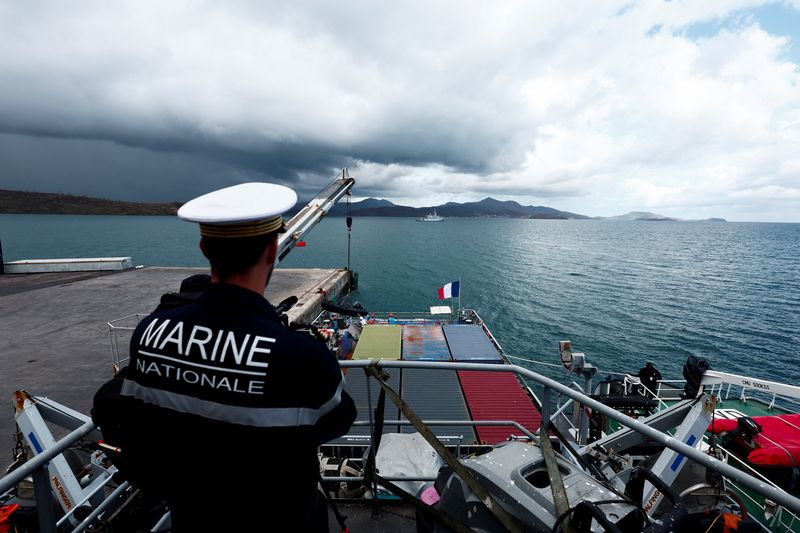By Tassilo Hummel
MAMOUDZOU (Reuters) -People in storm-ravaged Mayotte implored French President Emmanuel Macron to do more to help on Thursday as he toured the overseas territory where scores are feared dead in the rubble left by Cyclone Chido.
Some in the crowds that gathered outside the airport booed the presidential motorcade, while others said they were grateful for Macron’s visit and urged him to stay longer.
Officials in France’s have only been able to confirm 31 fatalities more than five days after the cyclone, but some have said they fear there could be thousands. A lawmaker told Macron that some victims had been buried in mass graves. Reuters could not immediately confirm that.
Many areas remain inaccessible. Heavy rain in the capital Mamoudzou and other areas has deepened the plight of thousands of people whose shantytown dwellings were flattened.
As Macron disembarked from a plane carrying food and medical aid, airport workers pleaded for support.
“Take your time. Stay with us. Give us solutions,” an airport security worker named Assane Haloi told him. “Give us emergency help, because in Mayotte, there is nothing.”
Macron’s office said he would stay on the islands overnight and visit neighbourhoods on Friday. It had not previously been clear how long he would stay.
His government has been accused by opposition politicians of neglecting Mayotte, and several residents of impoverished areas told Reuters they had not received any help since Chido struck.
“Your services are overwhelmed,” one man at the hospital told Macron in a testy exchange. “Help has not reached where I live.”
Macron said his government would send more support soon, including 400 more gendarmes to ensure security, and noted a surge of food and water arriving by air and sea.
“We all have to get together. From the first day people mobilized day and night. We must not divide ourselves,” he said.
DEATH TOLL UNCLEAR
The authorities have warned it will be difficult to work out how many have died in a territory that is home to large numbers of undocumented migrants from Comoros, Madagascar and other countries. Official statistics put Mayotte’s population at 321,000, but many say it is much higher.
Some victims were buried immediately, in accordance with Muslim tradition, before their deaths could be counted.
Health workers say they are bracing for a surge of disease as dead bodies lie unburied and people struggle to get clean drinking water.
“We are facing open-air mass graves, there are no rescuers, no one has come to collect the buried bodies,” Estelle Youssoufa, who represents Mayotte in the national parliament, told Macron. She did not say where the graves were.
Mayotte residents crowded water distribution points and wells to fill up jerrycans and buckets. Others did laundry or washed themselves in rivers.
“When we got here it was all devastated, nothing was standing,” El-Yassine Ibrahim told Reuters in Doujani, a poor neighbourhood south of Mamoudzou.
“Everything was ravaged. Since then, little by little, we’ve been sorting and gathering things, and we’ll see what we do next,” he said, as his relatives combed through the rubble.
Three out of four people in Mayotte live below the national poverty line. While it exports vanilla, coffee and cinnamon, it remains heavily dependent on support from metropolitan France and attracts relatively few tourists.
“All the pipes are broken everywhere. There is no more water in Mayotte. We need water to do the housework, to cook, to wash, to bathe. To drink water, we buy it in the stores,” Zalahta M’Madi, 44, said.

“No one tells us whether the water will be back tomorrow or the day after tomorrow or in a month. So we are all worried.”
The death toll in continental Africa, where the storm hit after passing through Mayotte, stood at 45 in Mozambique and 13 in Malawi, officials in those countries said.

